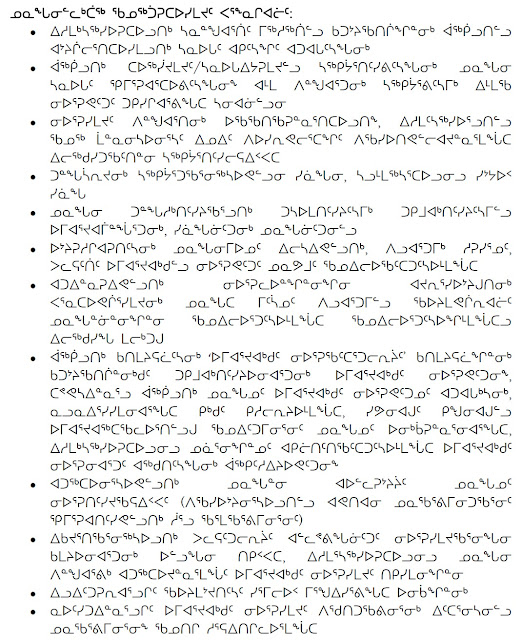During 2010, 47 people who have a connection to the cruise sector in Pond Inlet were interviewed. The questions related to the costs and benefits of the industry to the community. Those interviewed were also asked to think about strategies to minimize the costs and maximize the benefits of cruise tourism to the community, as well as to Nunavut more generally. This blog explains what the people in Pond Inlet had to say.
Thursday, 11 August 2011
Cruise Tourism Research Project
The Benefits of Cruise Tourism
The cultural shows were highlighted to provide unique opportunities for local performers to learn about Inuit culture, while also showcasing Inuit culture and traditions.
The guided walks were regarded as important to share local history with visitors. Cruise tourism in this sense was reported to make residents feel proud of their culture, elders and the work of the cultural group, and the local guides.
The opportunity to meet new people, make ‘friends’ and to participate in activities with visitors was highly valued. The generation of seasonal, indirect and supplementary income for the community, especially the guides, carvers, artists and performers was also noted. That cruises allowed relatively large numbers of visitors to hosted in a short was thought to be an efficient use of time and resources.
Concerns related to economy, culture and environment
Concerns related to economy, culture and environment included:
· Minimal spend among visitors (especially Europeans)
· Inappropriate and anti-social behaviour of some local children
· A sense of intrusion by cruise visitors
· Local protests may send the wrong message to cruise companies
· Standard of arts and crafts could be improved for saleability
· Adverse effect on marine wildlife
· Increased risk of marine pollution
· Variable ice conditions and existence of choke points in NWP
· Poor charting of safe shipping lanes throughout the Arctic
· Fear of passenger safety due to vessel’s grounding and/or sinking
· Increased risk of breaches bio-security and sovereignty
Management challenges at the community-level
· Lack of infrastructure to support vessels, and potentially larger vessels that are anticipated in the future
· Observed increases in the number of small vessels, and yachts in particular visiting the community
· Sometimes vessels cancel at short notice and conversely sometimes vessels arrive without prior notice
· Clustering of visits by cruise ships
· Visitor centre management and a lack of training for visitor centre staff
· Good people get attracted to better paying jobs
Governance challenges at the Territorial-level
· Cruise tourism not regarded as a priority and therefore suffers from lack of a coordinated approach throughout Nunavut
· No one agency or organisation taking a coordinating role at the Territorial level
· Lack of variety in the visitor experience across hosting communities in Nunavut
· Chronic lack of data on the cruise sector in Nunavut which undermines management and coordination efforts
· Impact of resource development in Nunavut on the cruise sector
Action Plans and Ideas: Where Should We Go From Here?
A selection of local residents, who are associated with cruise tourism in Pond Inlet, suggested the following actions and strategies for maximizing the benefits of this sector to the community while minimizing the negative.
Community-specific strategies
· Consider an Arts and Crafts Association and establish standard pricing policy
· Set up a regular Trade/Craft Show to market local goods and provide opportunities for demonstrations, possibly using the amphitheatre next to the visitor centre
· Provide opportunities for visitors to interact with performers, and consider ways to integrate modern Inuit culture into the cultural demonstrations
· Provide a better welcome at the beach, and clean up the beach area
· Provide a local liaison person to help improve communication and coordination between ship, shore and the community
· Raise awareness among local residents, and especially children, about the tourists and cruise tourism in Nunavut
· Provide a pre-trip planning guide for tour operators about the community and in particular to establish what is and what isn’t appropriate behaviour in the community
· Establish a local ‘Cruise Ship Committee’ to provide a coordinated approach to the management of cruise visits, as well as to develop a local cruise tourism policy, to clarify roles, provide pre and post season briefings to the community, and to consider charging a landing fee to cruise operators
· Use local guides more regularly for community tours (and include more cultural heritage sites such as the Sod House), and provide a vehicle for those visitors with limited mobility
· Provide more assistance at the visitor centre to manage tourists on the day of their visit, and consider use of the community centre for larger groups of cruise visitors
· Improve interpretive provision in Sirmilik National Park
· Monitor impact of cruise tourists at heritage and archaeological sites
Industry-specific strategies
· Appoint Inuit environmental monitors on the cruise ships
· Improve communication between ships and communities
· Provide an information sheet on the community for all passengers
· Coordinate itineraries to avoid clustering of cruise visits
· Provide reliable up to date itineraries so communities can be prepared
Territory-specific strategies
· Monitor and regulate all cruise ships visiting Nunavut including small vessels
· Develop a Nunavut-wide cruise tourism policy
· Streamline cruise permitting process across Nunavut
· Coordinate activities across all host communities to avoid duplication of visitor experiences, possibly via pre-season teleconference and debrief post-season
· Develop a port readiness programme akin to that in Newfoundland
· Appoint a cruise liaison representative at the Territorial level
· Provide workshops/training on hosting cruise visitors across Nunavut
Additional Information
Emma Stewart:
emma.stewart@lincoln.ac.nz
Lincoln University
New Zealand
Jackie Dawson:
jackie.dawson@uottawa.ca
University of Ottawa
Canada
Margaret Johnston:
mejohnst@lakeheadu.ca
Lakehead University
Canada
Subscribe to:
Comments (Atom)




















